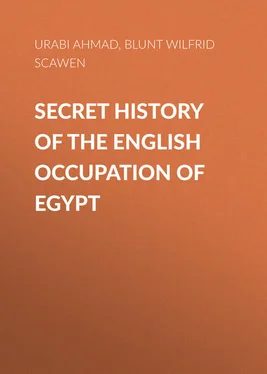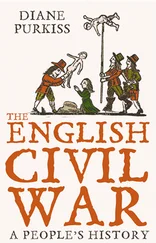Wilfrid Blunt - Secret History of the English Occupation of Egypt
Здесь есть возможность читать онлайн «Wilfrid Blunt - Secret History of the English Occupation of Egypt» — ознакомительный отрывок электронной книги совершенно бесплатно, а после прочтения отрывка купить полную версию. В некоторых случаях можно слушать аудио, скачать через торрент в формате fb2 и присутствует краткое содержание. Жанр: foreign_antique, foreign_prose, Историческая проза, на английском языке. Описание произведения, (предисловие) а так же отзывы посетителей доступны на портале библиотеки ЛибКат.
- Название:Secret History of the English Occupation of Egypt
- Автор:
- Жанр:
- Год:неизвестен
- ISBN:нет данных
- Рейтинг книги:4 / 5. Голосов: 1
-
Избранное:Добавить в избранное
- Отзывы:
-
Ваша оценка:
- 80
- 1
- 2
- 3
- 4
- 5
Secret History of the English Occupation of Egypt: краткое содержание, описание и аннотация
Предлагаем к чтению аннотацию, описание, краткое содержание или предисловие (зависит от того, что написал сам автор книги «Secret History of the English Occupation of Egypt»). Если вы не нашли необходимую информацию о книге — напишите в комментариях, мы постараемся отыскать её.
Secret History of the English Occupation of Egypt — читать онлайн ознакомительный отрывок
Ниже представлен текст книги, разбитый по страницам. Система сохранения места последней прочитанной страницы, позволяет с удобством читать онлайн бесплатно книгу «Secret History of the English Occupation of Egypt», без необходимости каждый раз заново искать на чём Вы остановились. Поставьте закладку, и сможете в любой момент перейти на страницу, на которой закончили чтение.
Интервал:
Закладка:
Such were my first thoughts about Egypt in the early days of 1876, not altogether inaccurate ones, though I was far from suspecting the growth already beginning of political ideas in the towns. Neither did I understand the full influence of European finance in the hardships from which the peasantry were suffering. Nevertheless, on our return to Cairo in March I saw something of the reverse of the medal. Mr. Cave's financial mission had arrived during our tour, and was established in one of the palaces on the Shubra Road, and from its members – one of whom was an old acquaintance, Victor Buckley of the Foreign Office, and from Colonel Staunton, our Consul-General – I learned something of the condition of financial affairs; while a little later Sir Rivers Wilson, also my friend, who was to play later so prominent a part in Egyptian affairs, appeared at Cairo and joined the other members of the financial inquiry. What their report was of the condition of affairs I need not here relate in detail, but it will help to an understanding of the matter if I give a very short account of it and how their mission came to be appointed, the first of its kind in Egypt. 1 1 Note. For a fuller and better account of the finance of that time serious students of Egyptian history should consult "Egypt's Ruin" by Theodore Rothstein published by A. C. Fifield, 13. Clifford's Inn, London, in 1910 with an introduction by me.
The Khedive Ismaïl's reign had begun in the full tide of a period for Egypt of high material prosperity. His predecessor, Saïd, a man of fairly enlightened views, had had the good sense to give all possible encouragement to the fellahin in agricultural matters. He had abandoned the claim of the Viceroy to be sole landlord on the Nile, had recognized proprietary rights in the existing occupiers of land, and had fixed the land tax at the low figure of forty piastres to the feddan. This had resulted in a general enrichment of the population, and the fellahin, emancipated from their old condition of serfdom to the Circassian Pashas, were everywhere accumulating wealth. Egypt at the close of Saïd's reign had become not only the most prosperous province of the Ottoman Empire, but one of the most progressive agriculturally of the Eastern world. The revenue, though small in comparison to what it is now, probably not more than four millions sterling, was easily collected, and the expenses of administration were insignificant, while the public debt amounted to only three millions. It is true that in his later years Saïd had granted a number of concessions to European adventurers on terms which were becoming a heavy burden on the state, but the general wealth of the country was so large that this was not more than its light taxation could bear, and the Viceroy had at his disposal, when all yearly claims had been discharged, probably not less than a couple of millions for his free expenditure. Certainly there never had been an age in Egypt when the mass of the native inhabitants had been so materially prosperous; and to the fellahin especially it had come to be spoken of as, for them, the "age of gold." Ismaïl, when in 1860 he succeeded to the Viceroyalty, was without question the richest of Mohammedan princes and master of the most prosperous of Mohammedan states.
Ismaïl's character, before he became Viceroy, had been that of a wealthy landed proprietor managing his large estates in Upper Egypt according to the most enlightened modern methods. He was praised by nearly all European travellers for the machinery he had introduced and the expenditure he had turned to profit, and it is certain that he possessed a more than usual share of that natural shrewdness and commercial aptitude which distinguishes the family of Mohammed Ali. His succession to the Viceroyalty had been more or less a surprise to him, for until within a few months of Saïd's death he had not been the immediate heir, and his prospects had been only those of an opulent private person. It was perhaps this unexpected stroke of fortune that from the beginning of his reign led him to extravagance. By nature a speculator and inordinately greedy of wealth, he seems to have looked upon his inheritance and the absolute power now suddenly placed in his hands, not as a public trust, but as the means above all things else of aggrandizing his private fortune. At the same time he was as inordinately vain and fond of pleasure, and his head was turned by his high position and the opportunity it gave him of figuring in the world as one of its most splendid princes. He was surrounded at once by flatterers of all kinds, native and European, who promised on the one hand to make him the richest of financiers, and on the other the greatest of Oriental sovereigns. In listening to these his own cleverness and commercial skill betrayed him, and made him only their more ready dupe. Ismaïl, before his accession, had been an astute money-maker according to the ways in which money was then made in Egypt, and he had had, too, a European education of the kind Orientals acquire on the Paris boulevards, superficial as regards all serious matters, but sufficient to convince him of his capacity to deal with the rogues of the Bourse with the weapons of their own roguery. In both directions he was led astray.
His first act of self aggrandizement was simple and successful. The revenue, which rested chiefly on the land tax, was low, and he raised it by progressive enhancements from the 40 piastres where he found it, to 160, where it has ever since stood. The country under his hand was rich and at first could afford the extra burden. Men gave of their superfluity rather than of their necessity, and for some years did so without complaint. This enhancement, however, of the revenue was only part of his rapacious program. His native flatterers reminded him that in the days of his grandfather the whole land had been regarded as the Viceroy's personal property, and that, moreover, Mohammed Ali had claimed and exercised for some years a monopoly of its foreign trade. Ismaïl schemed to revive these rights in his own person, and though he did not dare, in the face of European opinion, to commit any great acts of open confiscation in regard to the land, he gained to a large extent his ends by other means, and so rapidly that in a few years he managed to get into his own hands a fifth of the whole area of the cultivable land of Egypt. His method was by various means of intimidation and administrative pressure to make the possession of such lands as he desired to acquire a burden to their owners, and to render their lives so vexatious that they should be constrained to sell at prices little more than nominal. In this way he had, as I have said, possessed himself of an enormous property in land, and he doubtless thought that this was to prove to him a correspondingly enormous source of personal income. But his very covetousness in the matter proved his ruin. It was found in practice that while under his personal management as a comparatively small owner his estates had been well worked, and had brought him wealth, his new gigantic ownership laid him open to losses in a hundred ways. In vain he laid out enormous sums on machinery. In vain he laid whole villages and districts under contribution to furnish him forced labour. In vain he started factories on his estates and employed managers from Europe at the highest salaries. He was robbed everywhere by his agents, and was unable to gather from his lands even a fraction of the revenue they had brought in taxation when not his own. This was the beginning of his financial difficulties, coinciding as it did with the sudden fall in agricultural prices, and especially of cotton, which soon after set in, and it was the beginning, too, of the ruin of the peasantry, whom, to supply his deficiency, he now loaded with irregular taxation of all kinds. Ismaïl Sadyk, the notorious Mufettish, was his chief agent in this disastrous history.
Читать дальшеИнтервал:
Закладка:
Похожие книги на «Secret History of the English Occupation of Egypt»
Представляем Вашему вниманию похожие книги на «Secret History of the English Occupation of Egypt» списком для выбора. Мы отобрали схожую по названию и смыслу литературу в надежде предоставить читателям больше вариантов отыскать новые, интересные, ещё непрочитанные произведения.
Обсуждение, отзывы о книге «Secret History of the English Occupation of Egypt» и просто собственные мнения читателей. Оставьте ваши комментарии, напишите, что Вы думаете о произведении, его смысле или главных героях. Укажите что конкретно понравилось, а что нет, и почему Вы так считаете.












